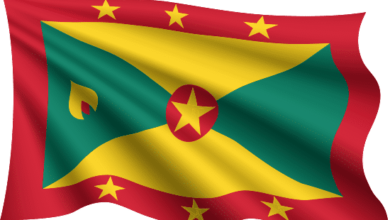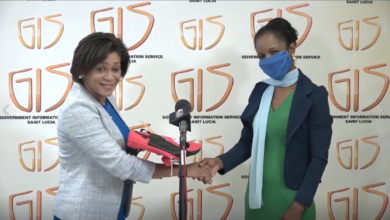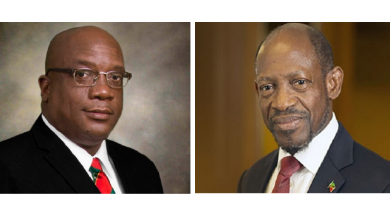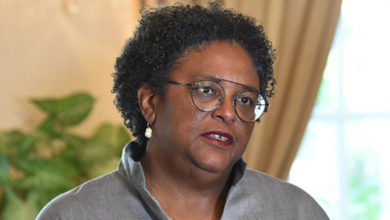(CARICOM Secretariat, Turkeyen, Greater Georgetown, Guyana) In response to an invitation from the Honourable, Mr. Stephenson King, Prime Minister of Saint Lucia, the CARICOM Secretariat sent a CARICOM Elections Observer Mission to monitor the just concluded Saint Lucia General Elections. The Mission comprised the following persons:
Ambassador Rudolph Collins, Guyana
Mr. Eugene Petty, St. Kitts and Nevis
Mr. Anthonyson King, Antigua and Barbuda
Mr. John Henry Haynes, Barbados
Ms. Paula Dawson, Belize
Ambassador Ellsworth John, St. Vincent and The Grenadines
Ms. Sadhna Dulam Getrouwd Gouri, Suriname
Mr. Kenneth Karijomenggolo, Suriname
Mr. Howard Cayenne, Trinidad and Tobago
Ms. Dennisia Francisco, CARICOM Secretariat
In addition to paying a courtesy call on the Prime Minister, the Mission spent the days immediately preceding the Elections in obtaining the perspectives of a wide cross section of the St. Lucian Community. It did so through interactions with leaders of the political parties contesting the Elections, representatives of the Chambers of Commerce, leaders of youth organizations, representatives of the national inter faith group and, wherever and whenever possible, with individual citizens of Saint Lucia.
The Mission also met with the Commissioner and Deputy Commissioner of the Royal Saint Lucia Police Force in relation to the security arrangements being put in place to ensure that the Elections were both orderly and peaceful.
The Mission found that a recurring and unanimous theme in all these interactions was the clearly expressed view that Saint Lucians have a tradition of respect for the democratic norms of civilized society and for the electoral process that underpins it. Against that background the individuals and groups with whom the Mission spoke were collectively of the view that while there may exist serious differences, particularly at election time, regarding the means towards achieving what was good for the country as a whole, Saint Lucians nevertheless had great faith and full confidence in their democratic electoral system.
The Mission also held discussions with Mr. Kenneth Monplaisir, Chairman of the Saint Lucia Elections Commission and Commissioner Michael Flood as well as with Mr. Carson Raggie, the Chief Elections Officer. These meetings were crucial in order gain a better understanding of the Saint Lucian electoral process and the particular steps that were put in place to ensure that Elections in Saint Lucia continued to be properly managed and that the electorate’s confidence in the process was in no way compromised or misplaced.
The Mission wishes to record that it did receive some expressions of concern, most of which were at the time already in the public domain, that there were aspects of both the elections campaign in general and the electoral process itself which could place in question the levelness of the electoral playing field. These concerns included discrepancies in the then available Voters’ List; uneven access to free radio and television time; campaign financing; the constitutional requirement for the revision of constituency boundaries; and inadequate public information regarding the voting process itself.
The Mission wishes to point out that although the concerns became an integral part of its information base, its mandate prevented it then, and it does now, from making any comment on them. To the extent however that some of the concerns raised may be considered by the Mission to be intrinsic to the amelioration of the electoral process then these, with appropriate recommendations, will form an integral part of the Mission’s Final Report. Thereafter in its ongoing process of constantly improving the Saint Lucia electoral system, the Government of the day will determine whether it will factor these recommendations into its consideration.
During many of its interactions the Mission was repeatedly made aware of the rising levels of political rhetoric as Elections Day approached with correspondingly less emphasis being placed on issues of significance to national development.
Indeed it was the observation by many to whom the Mission spoke that there had been a noticeable decline in levels of political conduct and that acrimonious debate was a contributory factor in this lowering of traditional standards. It was in this context that the Mission applauds the Code of Conduct, which just a few days previously had been signed by the political parties and in which this very issue had been addressed.
Even as it noted these observations regarding declining political standards as being an issue of increasing regional and international concern as well, the Mission also took particular note of the high sense of political maturity displayed by the two main political parties when on Sunday, 20 November, just a week before the Elections, their respective mass rallies, held in close proximity to each other, were conducted in an orderly and peaceful manner and, remarkably, without incident. It was a similar display of collective maturity that was witnessed by the Mission on Election Day.
The Mission therefore approached the General Elections with a data base of information that enabled it to monitor these Elections from the perspective of a well informed observer. It helped considerably too that the Mission had been privileged to witness the special voting of the disciplined services which were held last Friday, 25 November 2011.
On Election Day the Mission organized itself into five teams in order to maximize its resources to cover and monitor as much of the elections process as possible and to make a reasoned judgment of that process based on the observations of the respective teams. All 17 Constituencies were visited. The teams witnessed the electoral process at work for the opening and closing of the Polls, for the casting of ballots and for the arrangements to ensure the transparency of the voting process from the time the voter entered the restricted polling area to his/her departure from it. Finally, the teams observed the counting of the ballots at polling stations as well as the Final count.
The teams were unanimous in their appreciation of the orderly and peaceful manner in which voting was conducted. They expressed their satisfaction with the process as it played out throughout the day and noted the intensity but incident free nature of counting of the ballots. The teams were also unanimous in their observation that they encountered nothing that was likely to have had any negative impact on the outcome of the voting process and that each voter whom they observed appeared to be quite relaxed and confident that his/her vote was being processed within an efficient and just system.
It is therefore the conclusion of the CARICOM Observer Mission that the General Elections in Saint Lucia held on 28 November, 2011 in a calm and peaceful manner, can be considered, by any objective standard, to have been free and fair and that the results represented the will of the people democratically expressed through the secrecy of the ballot.
The CARICOM Observer Mission wishes to take this opportunity to thank all the organizations, groups and individuals whom it met for freely sharing their views on the electoral process in Saint Lucia and in so doing enabling the Mission to be of some service to that process. The Mission also wishes to express appreciation to the people of Saint Lucia for the warmth, kindness and courtesies accorded to its members.






